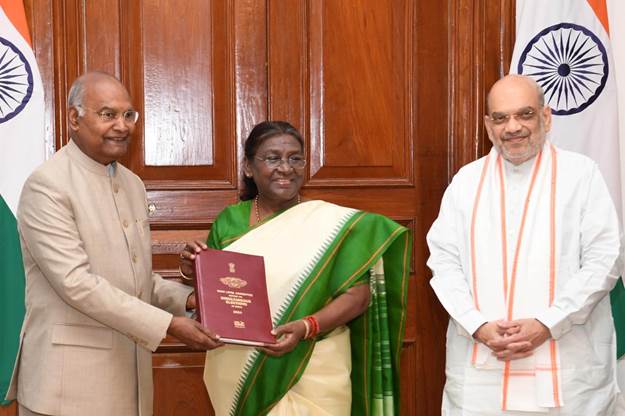Comprehensive Report on One Nation, One Election Unveiled by High Level Committee
Comprehensive Report on One Nation, One Election Unveiled by High Level Committee
A High-Level Committee on Simultaneous Elections, led by former President Ram Nath Kovind, presented its detailed report to President Droupadi Murmu. The exhaustive document, consisting of 18,626 pages, encapsulates the outcomes of rigorous consultations and 191 days of dedicated research and dialogue since its establishment on 2 September 2023.
The committee, comprising notable figures such as Amit Shah, Union Minister of Home Affairs and Minister of Cooperation; Ghulam Nabi Azad, former Leader of Opposition in Rajya Sabha; N.K. Singh, former Chairman of the 15th Finance Commission; Dr. Subhash C. Kashyap, former Secretary General, Lok Sabha; Harish Salve, Senior Advocate; and Sanjay Kothari, former Chief Vigilance Commissioner, engaged extensively with stakeholders across the spectrum. Arjun Ram Meghwal, Minister of State (Independent Charge) Ministry of Law and Justice, participated as a Special Invitee, with Dr. Niten Chandra serving as the Secretary of the HLC.
The committee's process included soliciting views from 47 political parties, with 32 expressing support for simultaneous elections. Public opinion also heavily favoured the proposal, with 80% of 21,558 citizen responses backing the idea. Discussions extended to legal experts, including former Chief Justices of India and High Courts, former Chief Election Commissioners, and the Election Commission of India itself.
Input from leading business organizations and economists highlighted the economic rationale for simultaneous elections, noting the negative impacts of staggered electoral cycles on inflation, economic momentum, and social harmony.
After comprehensive analysis, the Committee advocated a phased approach towards implementing simultaneous elections. Initially, elections for the House of the People and State Legislative Assemblies would be aligned. Subsequently, Municipal and Panchayat elections would sync up, scheduled within a hundred days of the national and state polls.
Further recommendations include the adoption of a unified electoral roll and Electoral Photo Identity Cards (EPIC) across all government levels, ensuring minimal constitutional amendments for implementation.
The Committee firmly believes that its proposals will bolster electoral transparency, inclusivity, and voter confidence, driving development, fostering social unity, and solidifying democratic foundations. This monumental step forward aligns with the vision of an aspirational India, advocating for a more streamlined and efficient electoral process.
Detailed Report and additional resources: Available at onoe.gov.in/HLC-Report, featuring versions in both English and Hindi, alongside informative flyers and FAQs for widespread public accessibility and understanding.
As the High-Level Committee's report on One Nation, One Election marks a significant step towards electoral reform in India, it paves the way for a fundamental shift in how elections could be conducted across the nation. The recommendations made by the committee not only aim to streamline the electoral process but also seek to mitigate the economic and administrative burdens associated with conducting multiple elections at different times.
The introduction of simultaneous elections is expected to have a profound impact on governance, enabling governments at both the central and state levels to focus more on development and policy implementation rather than being in a constant cycle of election preparation and campaigning. This shift is anticipated to enhance policy stability and create a more conducive environment for long-term planning and execution.
Moreover, the proposal for a unified electoral roll and the use of EPIC across elections is a move towards simplifying the voting process for citizens and enhancing the efficiency of the electoral system. These measures are expected to reduce discrepancies in voter lists and ensure a more inclusive and accessible electoral process for all eligible voters.
The committee’s emphasis on minimal constitutional amendments to implement these recommendations underscores a commitment to maintaining the spirit and framework of the Indian Constitution while seeking pragmatic solutions to contemporary challenges. This approach reflects a balance between respecting India’s democratic traditions and adapting to the evolving needs of its electoral democracy.
The overwhelming public support for simultaneous elections, as indicated by the responses received by the committee, suggests a collective aspiration for a more efficient and less disruptive electoral process. It underscores the public's desire for governance that is less interrupted by the electoral process and more focused on development and progress.
As the recommendations of the High-Level Committee on Simultaneous Elections are deliberated upon and potentially implemented, India stands on the cusp of a historic electoral reform. This reform has the potential to redefine the rhythms of Indian democracy, making it more synchronized, economical, and focused on the aspirational goals of its citizens. The path forward will require careful consideration, broad consensus, and meticulous planning to ensure that the envisioned benefits of simultaneous elections are fully realized, strengthening the fabric of India's democracy for future generations.


